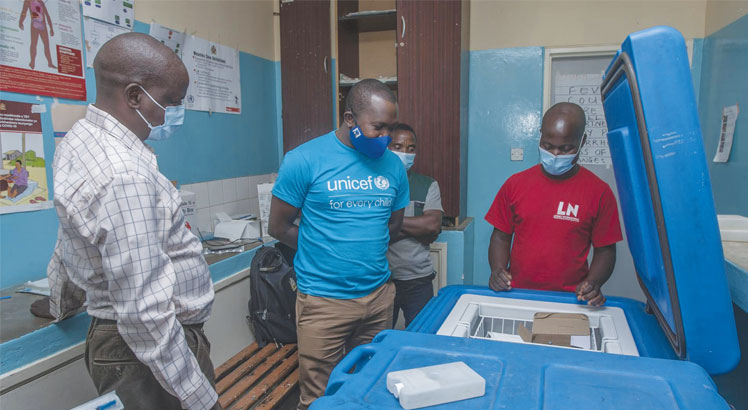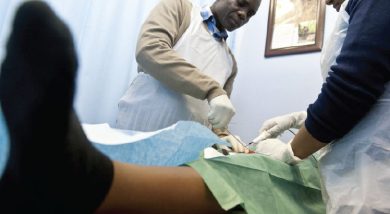Sunny with likely cyclones?
Even before Cyclone Freddy hit in March, Chavala Health Centre in Blantyre was struggling to keep running.
The clinic lies at the end of rocky dirt roads accessible only on foot or by high-clearance vehicles, including ambulances for referral patients and medical supplies.
“At times, we could have a high demand with low vaccine supplies, resulting in turning back many children. This discouraged the parents from returning the next day since they come from far,” says health surveillance assistant (HSA) Nelson Ching’amba.
Then Cyclone Freddy struck the Southern Region of Malawi and ruined some health facilities.
By the end of the month, the cyclone claimed more than 1 200 lives and cholera swept the country.
The national power grid collapsed as hydroelectricity plants down the Shire River took crippling damage. At Chavala, the electricity dropped, then surged, then dropped again. The facility’s only fridge went dark for good.
To keep routine immunisation on track, clinic staff started storing their vaccines in Chikowa Health Centre’s fridges, 22 kilometres away.
“It was our duty as HSAs to collect the vaccines on bicycles or on foot, depending on the weather,” recalls an HSA Nelson Ching’amba.
The community health workers collected few vaccines to avoid wasting them in case of poor turnout.

“We had no fridges to keep the vaccines chilled,” Ching’amba recollects.
Clinic staff reports that vaccination rates dipped to just 30 percent of the target of 50 children immunised per month and stayed that low for three long fridge-less months.
The storm also brought down some bridges, making outreach clinics impossible.
“I had delays or missing on immunisations altogether due to harsh weather conditions or due to immunisation stock-outs at this facility,” recalls Maria Limani, a mother of five from Padzuwa Village in Chikwawa district.
She went to the health facility for two consecutive weeks, but no vaccines were available.
Solar comeback
In June, Chabvala’s ruined fridge was replaced with a solarised fridge. Powered by solar panels that churn out electricity from sunlight, the new vaccine cooler is independent of the national grid.
To get to Chavala on time, Lemani leaves home at 5 am.
“Today, I arrived at around 8 am,” she says, cradling her 14-week-old baby wrapped in a flowery blanket to receive her fourth life-saving immunisation.
But the risk of frustration is much lower.
Melia Kaliyoti of Ntengeleni Village, Traditional Authority Kunthembwe in Blantyre, says: “Cyclone Freddy disrupted immunisation.
“My child missed some vaccines and he is just catching up now that the facility has a new fridge.”
Sunny days
Chabvala had been expecting a solarised fridge even before its old fridge blitzed out amid the cyclone’s assault on the electrical grid.
In fact, since October 2021, Unicef has been installed more than 450 solar-powered fridges in health facilities nationwide.
The solarised district vaccine stores, fitted in 29 districts, are worth $650 000 while the facility-based solar fridges cost 25 $450 000.
Unicef says nationwide installation is being done gradually, with 150 facilities in the installation process.
Unicef Malawi health specialist and head of child Health Dr Ghanashyam Sethy says the concern that power outages undermine a health centre’s ability to keep vaccines at the consistently cool temperatures they need to remain potent.
He believes that Malawi has missed vaccination opportunities prior to the solarisation as district hospitals have had other emergency priorities other than minding cold chains affected by frequent electricity failures.
Unicef is committed to looking after the newly installed equipment for two years while its expected lifespan is a decade, he explained.
They also monitor the solar equipment online using gadgets installed at every site. These devices have SIM cards that transmit data every few seconds to the online cloud and dashboard managed by the hardware manufacturer.
“When an error is identified, the contractor is required to respond to the issue immediately,” says Seyth.
For the long term, Unicef wants to build the capacity of the ministry technicians to monitor the data and completely manage the online dashboard.”
The ability to respond rapidly to storm damage promises only to become more useful with time.
Climate change and international development expert Dr Barbara Ntapala says Malawi is prone to increasing weather hazards like floods, droughts, and storms due to climate change.
“The disaster trend has increased in the past decade. Severity and intensity is likely to increase. Past storms’ harshness is an indication of more disastrous disasters to come,” she says.
Keeping it cool
Cyclone Freddy damaged 65 health facilities in Malawi, closing down 15, cutting off access to 10 and halving the capacity of the remainder.
Ministry of Health spokesperson Adrian Chikumbe noted that a ministry assessment found no damage at all to solar-powered equipment.
Meanwhile, Blantyre District Health Office’s Expanded Programme on Immunisation coordinator Myless Mhango says the solar-powered vaccine cold chain promises some relief from the risk of disasters now more frequent by climate chane. “We are assured of vaccine safety and uninterrupted routine immunisation,” she says. “This has increased the district’s immunisation coverage.”





